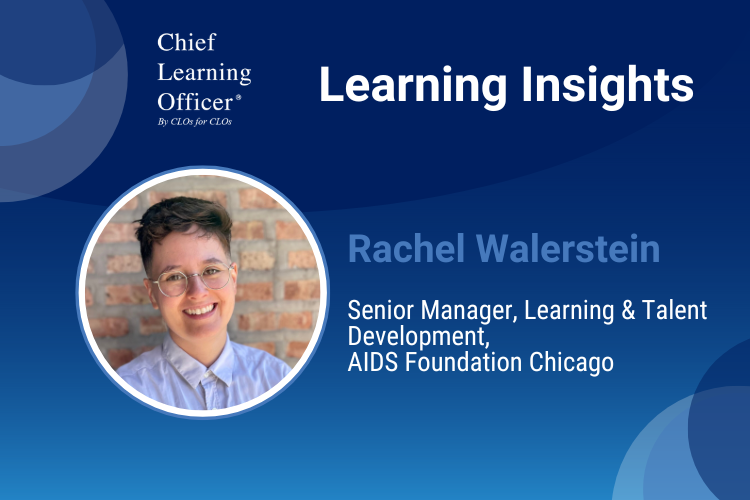Chief Learning Officer’s “Learning Insights” series is dedicated to showcasing the thoughts and career journeys of chief learning officers and learning executives—the tireless trailblazers who are transforming the landscape of corporate learning and workforce development. In this Q&A series, we garner strategic insights, innovative approaches and challenges overcome from visionary leaders worldwide.
CLO: What initially drew you to a career in learning and development, and how have your experiences evolved over the years?
I started my career wanting to be a teacher because school was where I felt safest as a kid. By the time I’d finished my undergraduate degree in education, however, I realized I had more questions about belonging: what it is, how it’s achieved and its importance for those of us with underestimated identities. So, I pursued a PhD in English literature. But while I was in school, many of the extracurricular activities I participated in focused on resolving systems-level problems that had very real and localized impacts on the people in those systems: namely, students and teachers. It was in my last formal teaching position that I realized I wanted to dedicate my skills and energy to that work, and began searching for a role in L&D. Now, I get to see the impact of my work with individuals, teams and organizations. I am motivated to continue democratizing access to training and professional development so that people feel empowered to take charge of their professional journeys.
CLO: What key initiatives have you implemented as a learning leader to drive employee development and foster a learning culture?
I think my favorite initiative has been part of AFC’s DEI programming. I host a podcast listening series called “Listen Up!” that meets biweekly. Staff gather with me on Microsoft Teams to listen to podcast series that touch on topics tied to the organization’s mission. It’s very popular for learners who are more passive in their preferences and don’t want to have to interact with anyone, but instead quietly listen. But even more extroverted staff are regulars too, who in turn serve as champions of the event. I also host a once-monthly session for our supervisor team that focuses on aligning their approach to management and leadership, while also encouraging them to see one another as teammates, and not siloed leaders. It’s an incredible space where managers of all levels come together to learn and discuss best practices, which results in informal mentoring on the spot.
CLO: What is the most impactful learning program you’ve introduced in your organization, and how has it contributed to employee growth and business success?
The most impactful has likely been our DEI and race equity training program. AFC’s mission is to create equity and justice for people living with and vulnerable to HIV or chronic conditions. Because some communities are more impacted than others in Chicago, it’s especially important that staff have a shared language and skillset for working across differences. More than that, it’s provided opportunities for us to come together as a team and a community. In a fully virtual or a hybrid workplace, learning events are such strong catalysts for community building. It’s been exciting to see teams coming together to think deeply about how they want to work and be in community. But truly, the program’s success comes from leadership’s unwavering support and prioritization.
CLO: What is a common misconception people might have about the L&D function, and how do you address it?
A common misconception is that training solutions are quick and easy to develop and that just assigning training will correct an issue. Sometimes they can be easy to develop and deliver. But when additional training is the best solution, whether it’s for one learner or one hundred learners, there can be multiple ways to source and deliver the training. That first step of reviewing all the best options can take time, especially when you want to deliver the best option for the audience within the context of your organization. That second piece though, about assuming that someone who has completed a training is now “fixed” is perhaps one of the most dangerous misconceptions L&D practitioners have to navigate. Moreover, the best way to navigate that misconception is to partner with the manager to provide support and coaching as the learner applies their new knowledge. But managers are not often provided what they need to do that kind of support work, and so the cycle of misconceptions continues.
CLO: What excites you the most about the future of workplace learning, and how are you preparing your organization to adapt to the changing landscape?
I’m excited that the current climate is such that employees are asking for professional development, and that organizations are, for the most part, listening. I’m also excited to see the wealth of ways people can engage in professional development: There are so many free webinars, podcasts, TED talks, books—I could go on! And with that multimodality can also come overwhelm and decision fatigue. How do I know what’s right for me and my goals? I try to show up for staff as a sounding board and coach. Because I don’t supervise them, there isn’t that power imbalance, and so we can have a much freer-flowing conversation about their goals and what it would take to get there. I also try and introduce choice into the design of our programming. For instance, it goes without saying that if you can’t attend, the recording will be available for 98 percent of learning events. Similarly, for our biggest programs, I try to offer a few events a quarter that learners can attend that will still deliver the content but honor their preferences and schedules. It’s not always easy on the back end, but it’s a small bit of extra labor I can take on, since time in a nonprofit setting especially is the biggest barrier staff report to investing in their own development.
CLO: What essential qualities or skills make a successful L&D leader, and how do you cultivate these traits in yourself and among your team?
Curiosity is such an important mindset to possess as an L&D leader. Being curious allows you to ask more and better questions, experiment, receive feedback and act on it, and in general model the kind of growth mindset you hope learners have or can eventually adopt. I’ve always been curious, but I keep my curiosity active in many ways. One of my hobbies is cooking, which is a skill set with so many things to learn: how to combine flavors, the history of a cuisine, new techniques, which equipment will best serve your style of cooking. It’s also a low-stakes way to get comfortable with failure. Just recently I made a sourdough loaf I’ve made hundreds of times, but it didn’t rise properly. So when I went to use it to make sandwiches, I had to get creative with how I could cut it to make a proper sandwich. Cooking keeps me both curious and humble. And humility is an equally important mindset for L&D leaders. We are rarely the subject matter experts in a room, and we also often have to receive feedback on what we’re doing well, what we could do better, and what we should do instead. Humility helps the L&D leader really process that feedback, find the value in it, and do something with it. There are so many ways to cultivate this mindset, but I often find just showing up authentically to conversations with staff about their needs and their struggles helps me continue to exercise this mindset.
CLO: What game-changing advice would you offer if you could go back in time and mentor your younger self?
Keep asking and following your questions. It will sometimes feel scary. It will sometimes be destabilizing. But it will lead you to the safety and stability you seek.
CLO: What do you feel is currently the single biggest challenge facing L&D professionals and the industry as a whole?
That training is a singular event, rather than an ongoing process of growth.
CLO: We’re always looking to showcase innovative tools and technologies. Can you share one work or learning tech product or platform that has significantly improved your work processes and why you find it valuable?
I’ve been experimenting with AI much more as of late. I really appreciate how it can get those hard-to-write email drafts started. I also am appreciative of its ability to process massive amounts of information quickly. It’s so powerful for reviewing truly essential competencies in job families for instance just by reviewing job descriptions. It’s a true game-changer for L&D.
Interested in being featured in our “Learning Insights” series? Please complete this FORM.















